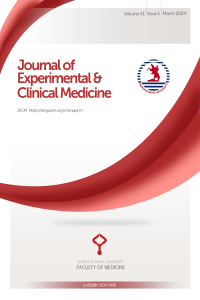Abstract
The surgical evacuation is considered as the first choice of treatment for symptomatic chronic subdural hematoma. Since anticoagulation is considered a risk factor and any ongoing anticoagulation treatment is ceased once the diagnosis is confirmed, the data regarding the course of these cases under ongoing anticoagulant treatment remains extremely limited. A 73-year-old female was given antiplatelet treatment for ischemic stroke for right hemiparesis and dysarthria despite an existing, but unrecognized chronic subdural hematoma. The hematoma was discovered after 4 weeks following antiplatelet treatment, but in a smaller volume. As routine practice antipaletelet treatment was ceased and the hematoma completely resolved within 2 weeks. This case demonstrates that some patients with chronic subdural hematoma for whom continuation of anticoagulation is essential, can be observed closely if hematoma volume is small and no midline shift is present since spontaneous resolution may occur.
References
- Yang W, Huang J. Chronic Subdural Hematoma: Epidemiology and Natural History. Neurosurg Clin N Am. 2017; 28(2): 205-210.
- Soleman J, Nocera F, Mariani L. The conservative and pharmacological management of chronic subdural haematoma. Swiss Med Wkly. 2017; 147: w14398.
- Junior MGP, Pessoa BL, Landeiro JA, de Abreu Macedo PH, Leite MAA. Spontaneous resolution of chronic subdural hematoma: Does only the size matter? Surg Neurol Int. 2019; 10: 194.
- Kim HC, Ko JH, Yoo DS, Lee SK. Spontaneous Resolution of Chronic Subdural Hematoma : Close Observation as a Treatment Strategy. J Korean Neurosurg Soc. 2016; 59(6): 628-636.
- Tiwari AR, Maheshwari S, Balasubramaniam S, Devendra T, Savant H. Spontaneous Resolution of Non Traumatic Chronic Subdural Haematoma Despite Continued Antiplatelet Therapy: A Case Report. J Clin Diagn Res. 2015; 9(6): Pd01-2.
- Neth BJ, Ighodaro ET, Brinjikji W, Cloft H, Scharf EL. Management of Chronic Subdural Hematoma in Patients Requiring Therapeutic Anticoagulation. Neurologist. 2022; 27(4): 211-213.
- Yang S, Zhang X, Jin Y. Spontaneous resolution of nontraumatic chronic subdural hematoma associated with anti-aggregation therapy. J Craniofac Surg. 2014; 25(4): e363-5
Abstract
References
- Yang W, Huang J. Chronic Subdural Hematoma: Epidemiology and Natural History. Neurosurg Clin N Am. 2017; 28(2): 205-210.
- Soleman J, Nocera F, Mariani L. The conservative and pharmacological management of chronic subdural haematoma. Swiss Med Wkly. 2017; 147: w14398.
- Junior MGP, Pessoa BL, Landeiro JA, de Abreu Macedo PH, Leite MAA. Spontaneous resolution of chronic subdural hematoma: Does only the size matter? Surg Neurol Int. 2019; 10: 194.
- Kim HC, Ko JH, Yoo DS, Lee SK. Spontaneous Resolution of Chronic Subdural Hematoma : Close Observation as a Treatment Strategy. J Korean Neurosurg Soc. 2016; 59(6): 628-636.
- Tiwari AR, Maheshwari S, Balasubramaniam S, Devendra T, Savant H. Spontaneous Resolution of Non Traumatic Chronic Subdural Haematoma Despite Continued Antiplatelet Therapy: A Case Report. J Clin Diagn Res. 2015; 9(6): Pd01-2.
- Neth BJ, Ighodaro ET, Brinjikji W, Cloft H, Scharf EL. Management of Chronic Subdural Hematoma in Patients Requiring Therapeutic Anticoagulation. Neurologist. 2022; 27(4): 211-213.
- Yang S, Zhang X, Jin Y. Spontaneous resolution of nontraumatic chronic subdural hematoma associated with anti-aggregation therapy. J Craniofac Surg. 2014; 25(4): e363-5
Details
| Primary Language | English |
|---|---|
| Subjects | Brain and Nerve Surgery (Neurosurgery) |
| Journal Section | Case Report |
| Authors | |
| Publication Date | March 29, 2024 |
| Submission Date | December 3, 2023 |
| Acceptance Date | December 20, 2023 |
| Published in Issue | Year 2024 Volume: 41 Issue: 1 |
Cite

This work is licensed under a Creative Commons Attribution-NonCommercial 4.0 International License.


